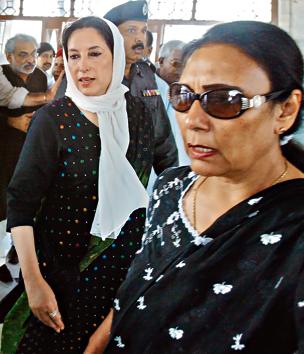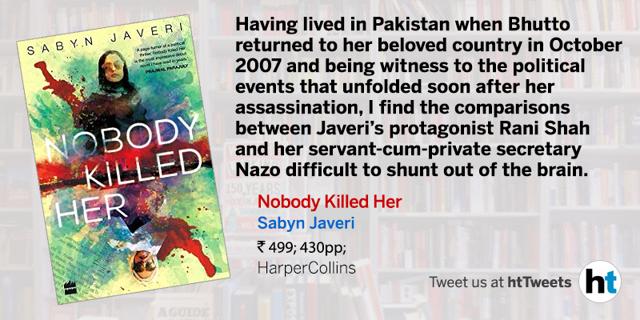Review: Nobody Killed Her by Sabyn Javeri
A whodunnit that takes in the journey of two women down Pakistan’s corridors of power
Pakistan’s former prime minister Rani Shah has been assassinated. The needle of suspicion points towards her close confidante Nazneen Khan also known as Nazo – who was sitting right beside her in the convoy and escaped unscathed.

Sabyn Javeri’s whoddunit - “Nobody Killed Her” - about two ambitious women’s journey through Pakistan’s corridors of power is likely to remind readers of the country’s former prime minister Benazir Bhutto and her loyal aide Naheed Khan.
Except that Javeri, the newest addition to fire up the literary circuit from across the border, claims it isn’t.
“I find people who reduce the book to a simple story about Bhutto and her secretary very limited in their intellect and very literal in their power of comprehensions,” she has been reported as saying.
Having lived in Pakistan when Bhutto returned to her beloved country in October 2007 and being witness to the political events that unfolded soon after her assassination, I find the comparisons between Javeri’s protagonist Rani Shah and her servant-cum-private secretary Nazo difficult to shunt out of the brain. Even Shah’s husband’s character seems modelled on “Mr 10 percent” - an uncanny resemblance to Asif Ali Zardari, the man Bhutto married in real life.

Just that Javeri’s book is not set in 2007 and General Pervez Musharraf is not the chief of the army when Bhutto returned to Pakistan. The book is set in the 1980s, an unnamed general is trying to Islamicise the country, and is eventually killed in a plane crash – yes, a case of exploding mangoes.
“Villagers who found them (mangoes) said they tasted good enough to die for!”
Call it a case of “limited intellect” and a faulty “comprehension” - but reading “Nobody Killed Her” transported me back in time. In fact, I found merit in the book - “unputdownable” as they say for page-turners – precisely for this reason.
It connected me with real people, with realpolitik. Most importantly, it helped me connect with Javeri’s real plot - how difficult political journeys are for women in our subcontinent, how sham our democracies are, how deeply entrenched patriarchy is, how fanaticism is unleashed in its many shades.
Once the plot sinks in about the two leading ladies – the haves and the haves-not they are born into, and their social and political maneuvrings for their future must-haves– Javeri’s beautiful writing registers. Every full stop, every comma hits hard.
The story of love, loyalty, obsession and deception – the machinations of human nature - spill out, page after page, climaxing at page 430.
Rani dreams of returning to Pakistan to fulfil her “daddy’s” dream – daddy, the only elected PM of Pakistan, who was executed by the general. The general killed her brother too and dumped her in a dark cell with roaches and rats and tortured her.
Nazo is the servant-girl whose family has also been killed by the general. She survived because she was smart enough to slide under the bed where she was soon joined by her father’s severed head.
Nazo makes it to New York, to serve Rani Madam, and ends up taking charge of her life.
Because Rani Madam is emotional and impulsive, lives a rather Bohemian life, uncaring about her drinking and smoking habits or casual sexcapades – for which many lashes and in the worst case death await in her country.
Rani is the only way Nazo can seek revenge for her family’s killing. So Nazo dedicates her life – her brain and body to Rani. Unfortunately, Rani is too busy re-reading “Crime and Punishment” to comprehend the radicalisation of Pakistan, a hitherto modern nation which is now forcing its women to wear veils, banning its girls from going to schools.
Nazo pushes Rani out of her stupor, managing her image, packaging her as a political product. Hiding her cigarette packs, shooing away her boyfriends, even making love to her to revive her spirit. Never letting Rani lose the bigger picture, when she decides to marry a flamboyant man, when she decides to revel in the joys of impending motherhood, the domestic bliss.
“So many times, in these past few days I had caught you talking to your dead father’s photograph. ‘I will be just like you,’ I would hear you say. ‘I’ll have a house full of happy children and lead the Nation as well.’
“You fool! I wanted to shout out. He was a man. He could have had ten wives and a hundred children, yet he’d be able to step out of the house each morning, go to work and not think once about them.”
Nazo is in-charge in all these moments. Cradling Rani who is crumbling under pressure, boosting her confidence and her self-esteem. But there are other clandestine moments too – the underhand dealings and the womanising that Rani isn’t aware of – that Nazo balances with brilliance for political benefits.
In the bargain, Nazo swallows the sniggers and the slaps – of course for the larger good of the nation. She even decides to take a stab to protect the future queen, and to secure her place in the social and political hierarchy.
Nazo is also Rani’s conscience-keeper. Rani is pregnant with a girl.
“The bitch is a girl,” says Rani.
“Shame on you!” says Nazo, to the queen bee who had spent her life proving to men that women were equal if not better.
Rani calls her a “feminist” a term Nazo, the servant-girl, doesn’t understand.
“Someone who believes in equality of women,” Rani explains.
Those are the layers, the subtexts that Javeri wants her readers to read and appreciate - the undercurrents and dynamics of power play, especially true for women in the subcontinent. And she scores rather well here.
Read more: THERE’S A UNIVERSAL LOATHING FOR ZIA
A highly recommended read for those who live in a politically-insulated world and haven’t heard of the Bhuttos’ trials and tribulations or the other famous dynasty on this side of the Indus – the Gandhis.
For the others, chances are you will like this racy read and may not be able to overlook the obvious connection/s. It’s ok to have limited intellect.



